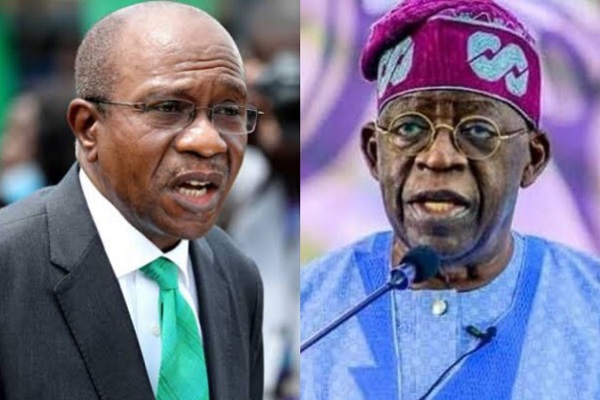ISHAYA IBRAHIM writes that the ‘sins’ of Emefiele can broadly be categorized into two – economics and politics.
Governor Godwin Emefiele has one more year to finish his two terms of the ten-year regime at the Central Bank of Nigeria (CBN).
But the next 12 months remaining are expected to be problematic for Emefiele. The reason is that the new president, Bola Ahmed Tinubu, appears not to like him.
The politics
Emefiele, through proxies, picked the All Progressives Congress (APC) presidential nomination form of N100 million.
Recall that Tinubu had said the ticket of the APC was his turn to have because of the enormous contribution he gave towards ensuring President Muhammadu Buhari’s victory in 2015.
When Emefiele through proxies, picked the N100 million nomination form of the APC, the Tinubu’s camp believed he was a formidable opponent because of the perceived backing he was receiving from some elements in Aso Rock.
With pressures from Nigerians that a CBN governor shouldn’t be running for president while remaining in office, Emefiele backed out of the race.
But five months after Emefiele backed out of the presidential race, he announced the redesign of N200, N500 and N1,000 notes.
READ ALSO
Tinubu: Can he fight corruption?
What Nigerians expect from Tinubu as President
The CBN governor also announced that the old notes would cease to be legal tender by January 31, 2023, just weeks away from the presidential election.
Tinubu alleged that the policy was targeted at him because Naira became very scarce. And that appeared to put Nigerians on a war footing against the ruling party.
Also, the timing was problematic. It came at a time fuel scarcity was at its peak.
Fearing that the Naira and fuel scarcity could combine to undermine his chances, Tinubu screamed during a massive rally in Abeokuta that the Naira and Fuel scarcity were orchestrated to frustrate his presidential chances.
That anti-government rhetoric Tinubu made appeared to change the tide and drew some sympathy to his side.
Tinubu eventually won the election, although being disputed by Peter Obi of the Labour Party and Atiku Abubakar of the Peoples Democratic Party at the Presidential Election Petition Tribunal.
Tinubu may not have forgiven Emefiele for putting him through this stress.
The Economics
When on February 20, 2014, President Goodluck Jonathan appointed Emefiele, then Managing Director of Zenith Bank to become Governor of the Central Bank of Nigeria, naira was exchanged at N165 to a dollar. At the parallel market a dollar exchange for not more than N171 at the time.
At the start of 2015, a combination of factors, including the crude oil glut in the international market and the poor performance of Nigeria in non-oil exports put the Naira on a sliding slope.
By the time President Muhammadu Buhari took over the reins of power, Naira exchanged at N175 to a dollar. At the parallel market, it was N197 to a dollar.
Naira’s free fall
Naira started to fall at alarming rate after President Buhari refused to appoint cabinet ministers to give his government focus in the first six months of his administration.
By 2016, the Nigerian economy entered a recession after the country’s Gross Domestic Product (GDP) contracted back to back in two quarters. Naira at this time was exchanged at nearly N500 to a dollar at the parallel market and N289 at the official market.
Emefiele, in trying to mitigate the poor showing of the Naira on the Nigerian economy, introduced multiple exchange rates, including a special window for SMEs, investors and manufacturers.
The multiple exchange rates resulted in the further widening of the gulf between the parallel and the official markets.
While the dollar currently exchanges at N460 at the official market, it goes for nearly N800 at the parallel market. This situation has been having a telling effect on the Nigerian economy.
The Nigerian Economic Summit Group (NESG), in a communiqué issued in August last year, urged the CBN to find a solution to the country’s multiple exchange rates as a way to attract tangible Foreign Direct Investments (FDIs).
Part of the Communique reads: “The failure to address the prevailing condition of multiple exchange rates continues to reduce the much-needed flow of foreign investments and official diaspora remittances.
“International investors, being savvy and rational, will not invest where there is a real risk to their ability to access and repatriate investment proceeds or when the functional currency is in sporadic depreciation.
“Multiple foreign exchanges (FX) markets with significant price differentials create room for speculation, round-tripping, cronyism and outright graft – with an attendant adverse effect on the economy.”
Scapegoating others
But the CBN governor, instead of looking into the many calls to reconsider the multiple exchange rate policy, decided to look for a scapegoat.
In September 2021, Emefiele appeared to be sure that the problem of the Naira was due to the publication of parallel market exchange rates on the website of Aboki FX.
Aboki FX is a website that collates the black market exchange rates of the Naira against other currencies.
The website is published by Oniwinde Adedotun, a Nigerian living in the UK.
After the allegation by Emefiele that Aboki FX’s publication was damaging the value of the Naira, the publisher, Oniwinde Adedotun, suspended the publication.
Naira did not gain, rather it continued to suffer losses one year after Aboki FX suspended the publication of parallel exchange rates on its websites.
Experimentation
In November 2022, when the CBN governor announced the redesigning of N200, N500 and N1000 notes, the naira jumped to nearly N900 to the dollar at the parallel market.
In announcing the Naira redesign change, Emefiele also hinted at the possibility that the Naira’s value would appreciate.
So, far, there has not been any respite for the Naira.
Also recall that the CBN had in June 2015, released a circular, listing 41 items as not valid for foreign exchange (forex) through the official forex window.
Olakanmi Gbadamosi, the apex bank director of trade and exchange at the time, said the exclusion of these items was in order to ensure “efficient utilization of forex.”
The CBN also argued that the move would encourage patronage of locally made goods, pushing its argument with the exaggerated claim that Nigerians were still in the business of importing toothpicks.
After the ban, many manufacturers in the country complained that the bank’s action was affecting over 700 products in the market.
Speaking at TheCable colloquium in 2015, Muda Yusuf, president of the Lagos Chamber of Commerce and Industry (LCCI), who was represented by Vincent Nwani, said the ban was hurting 728 businesses.
“The 41 items that were banned by the CBN from accessing forex from official sources to us in the chamber is like 728 lines of product. To them, they see it as 41 items,” Yusuf had said.
“We don’t subscribe to importing toothpicks, tomato paste and all of that but there are key manufacturing items we are looking at.
“Out of the 41, we brought about 12 items to them that we don’t have the capacity to meet this. For example, everybody knows that Nigeria is rich in palm oil, but the local demand capacity is 1,800 metric tonnes per annum.
“Today the domestic production is just 600 metric tonnes. You need about five to eight years for the best seed of palm oil to yield.
“We demanded some lag, but this is not happening.
“I can tell you that about 80,000 jobs are at risk in the manufacturing sector.”
The Judgment ahead
So far, the CBN Governor appears to have been playing Russian roulette with the Naira.
That sentiment has been echoed loudly by the Tinubu’s camp, and they seem to be eager to take their revenge for his political sin of making the Naira scarce.
Tinubu’s vocal spokesman, Bayo Onanuga, has already given an indication of what is to expect when he shared a statement via his Twitter handle of the Zamfara Governor’s rebuke of Emefiele.
The statement echoes the mood of Tinubu’s camp: “Emefiele superintended over the management of the country’s financial and monetary systems. He is the one who initiated and implemented the recent disastrous Naira swap policy, the Naira confiscation program, which put Nigerians through untold woes and trauma and set our economy backwards.
“Two of my brother-governors and I took the Federal Government to court over this ill-advised policy and fought resolutely until we got a respite for our people from Emefiele and company.
“This same Emefiele now wants to proceed on study leave when he has some 10 months left of his tenure apparently in a bid to evade rendering accounts. This is unacceptable.
“President Buhari should not countenance this. Emefiele must stay at his job to give full accounts of all that transpired under his watch to the incoming administration. He must answer all the questions the new regime may have for him particularly when he still has some months left of his tenure.”











